
The EZ-Link card is a contactless smart card used for the payment of public transportation fares in Singapore.
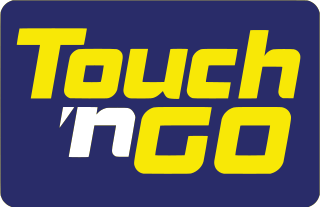
The Touch 'n Go or TnG smart card is used by Malaysian toll expressway and highway operators as the sole electronic payment system (EPS). The credit card-sized smart card is made of plastic with Philips' MIFARE Classic microchip technology embedded in it.
FeliCa is a contactless RFID smart card system from Sony in Japan, primarily used in electronic money cards. The name stands for Felicity Card. First utilized in the Octopus card system in Hong Kong, the technology is used in a variety of cards also in countries such as Singapore, Japan, Indonesia and the United States.

Nagasaki Smart Card is a contactless smart card system used in Nagasaki, Japan. Its operators are Nagasaki Electric Tramway and six bus companies, namely, Nagasaki Bus, Nagasaki Prefectural Bus, Saihi Bus, Saikai Kōtsū, Sasebo Municipal Bus, and Shimatetsu Bus. The system uses Sony FeliCa technology, the same as that used in the Octopus card in Hong Kong, EZ-Link in Singapore and Suica on JR East.

The EasyCard is a contactless smartcard system operated by the EasyCard Corporation, which was previously named the "Taipei Smart Card Corporation", for payment on the Taipei Metro, buses, and other public transport services in Taipei since June 2002, expanded to multiple place of business. Its use has also since been expanded to include convenience stores, department stores, supermarkets, taxis, and other retailers since 1 April 2010. Like conventional electronic fare systems, the card employs RFID technology to operate without physical contact. They are available for purchase at all Metro stations and all chain convenience stores.

The Clipper card is a reloadable contactless smart card used for electronic transit fare payment in the San Francisco Bay Area. First introduced as TransLink in 2002 by the Metropolitan Transportation Commission (MTC) as a pilot program, it was rebranded in its current form on 16 June 2010.
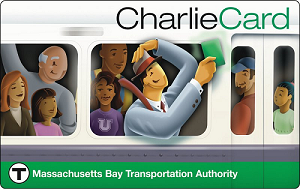
The CharlieCard is the payment method for the Massachusetts Bay Transportation Authority (MBTA), and several regional public transport systems in the U.S. state of Massachusetts. It is a MIFARE-based contactless smart card on which the passenger loads fares, and was introduced on December 4, 2006. It replaces the metal token, that last of which was sold at Government Center station on December 6, 2006. The CharlieCard is named after a fictional character in the folk song "M.T.A.", often called "Charlie on the MTA", which concerns a man forever trapped on the Boston subway system – then known as the Metropolitan Transit Authority (MTA) – because he cannot pay the 5-cent surcharge required to leave the train. One day the traditional CharlieCard system will be replaced with AFC 2.0, a system similar to the London Oyster Card. The new system will allow payments with contactless cards and smartphones, as well as new CharlieCards.

Because the rail operators are government-assisted profit-based corporations, fares and ticketing on Singapore's Mass Rapid Transit (MRT) system are currently aimed at least in breaking even to at least compensate for their costs of running the system. The rail operators collect fares by selling electronic tickets capable of storing data, the price of which is calculated based on the distance between the start and destination stations. These prices increase in fixed stages for standard non-concessionary travel. From the information that was earlier written in these tickets, it is possible to increase the fare according to increments based on approximate distances between stations.

A contactless smart card is a contactless credential whose dimensions are credit-card size. Its embedded integrated circuits can store data and communicate with a terminal via NFC. Commonplace uses include transit tickets, bank cards and passports.

Gemalto is an international digital security company providing software applications, secure personal devices such as smart cards and tokens, and managed services. It is the world's largest manufacturer of SIM cards.

Pasmo is a rechargeable contactless smart card, electronic money system. It is primarily used for public transport in Tokyo, Japan, where it was introduced on March 18, 2007. Pasmo can also be used as a payment card for vending machines and stores.

Contactless payment systems are credit cards and debit cards, key fobs, smart cards, or other devices, including smartphones and other mobile devices, that use radio-frequency identification (RFID) or near field communication for making secure payments. The embedded chip and antenna enable consumers to wave their card, fob, or handheld device over a reader at the point of sale terminal. Contactless payments are made in close physical proximity, unlike mobile payments which use broad-area cellular or WiFi networks and do not involve close physical proximity.

Vix Technology (Vix) is a company that designs, supplies and operates automated fare collection (AFC) systems, intelligent transportation systems (ITS) and passenger information display systems (PIDS) for the public transit industry.

Osaifu-Keitai, literally "Wallet Mobile", is the de facto standard mobile payment system in Japan. Osaifu-Keitai services include electronic money, identity card, loyalty card, fare collection of public transits, or credit card.
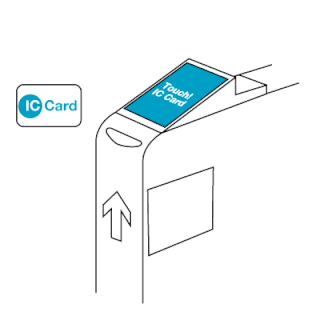
Manaca, written in lower-case letters, manaca is a rechargeable contactless smart card used in Nagoya, Japan and the surrounding area since February 11, 2011, when it replaced the Tranpass magnetic fare card system. As of March 23, 2013, it became compatible with 9 other IC cards, allowing it to be used nationwide.

Opal is a contactless fare collection system for public transport services in the greater Sydney area of New South Wales, Australia. Operation of the Opal system is managed by the New South Wales Government's transport authority, Transport for NSW. First launched in late 2012, Opal is valid on Transport for NSW's bus, rail, light rail and ferry services that operate in Sydney and the neighbouring Central Coast, Hunter Region, Blue Mountains and Illawarra areas. It is also accepted on train services in the Southern Highlands. Opal equipment was designed from the start to support a variety of cards, but launched with the captive Opal cards.
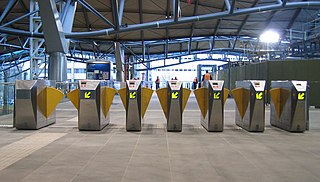
An automated fare collection (AFC) system is the collection of components that automate the ticketing system of a public transportation network - an automated version of manual fare collection. An AFC system is usually the basis for integrated ticketing.
BusPlus is the payment method for the GSP Belgrade, Belgrade tram system, Lasta Beograd and BG TRAIN. It is a thin, plastic card on which the customer electronically loads fares. The BusPlus is managed by company Apex Technology Solutions. Public authorities state that BusPlus was implemented to increase the revenue of the public transit authority and to improve the public transport system by getting better information on usage. Reports from September 2012 have indicated that the overall revenue has increased, but some aspects of integration have been criticized by public. System is installed by Kentkart, an automatic fare collection system integrator company.
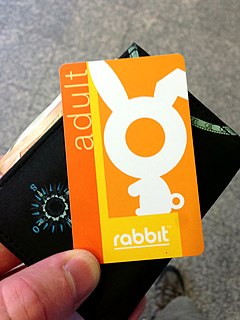
The Rabbit Card is a rechargeable contact-less stored value smart card used to transfer electronic payments in systems in Thailand. It was launched in May 2012 to collect fares for the BTS Skytrain and the Bangkok BRT. The card can be recharged at minimum THB100 at a time. It can be recharged at all BTS and BRT ticket offices and most of McDonald's branches in Thailand.

















